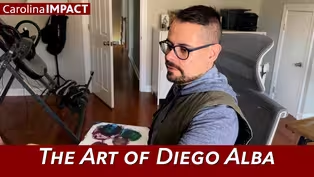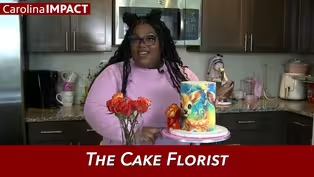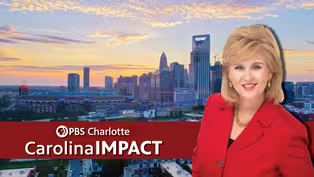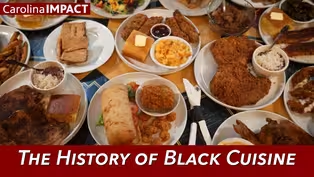
The Catawba Nation | Carolina Impact
Clip: Season 12 Episode 1214 | 5m 9sVideo has Closed Captions
See how generations of Catawba Indians keep their traditions alive.
Imagine your favorite family tradition… we all hold those close to our heart. But, how much do you know about the Catawba Nation’s traditions? The latest U.S. Census shows less than 3% of the total population identifies at least partially as American Indian or Alaska Native. Learn more about The Catawba Nation, only on Carolina Impact.
Problems playing video? | Closed Captioning Feedback
Problems playing video? | Closed Captioning Feedback
Carolina Impact is a local public television program presented by PBS Charlotte

The Catawba Nation | Carolina Impact
Clip: Season 12 Episode 1214 | 5m 9sVideo has Closed Captions
Imagine your favorite family tradition… we all hold those close to our heart. But, how much do you know about the Catawba Nation’s traditions? The latest U.S. Census shows less than 3% of the total population identifies at least partially as American Indian or Alaska Native. Learn more about The Catawba Nation, only on Carolina Impact.
Problems playing video? | Closed Captioning Feedback
How to Watch Carolina Impact
Carolina Impact is available to stream on pbs.org and the free PBS App, available on iPhone, Apple TV, Android TV, Android smartphones, Amazon Fire TV, Amazon Fire Tablet, Roku, Samsung Smart TV, and Vizio.

Introducing PBS Charlotte Passport
Now you can stream more of your favorite PBS shows including Masterpiece, NOVA, Nature, Great British Baking Show and many more — online and in the PBS Video app.Providing Support for PBS.org
Learn Moreabout PBS online sponsorship(loud drums) - [Dara] Each person moves in their own way to the beating of the drums and soulful chanting.
(loud drums) Some lift their knees and energetically twirl in a circle.
Some jump just enough to shake the bells.
Others march slow and steady, one foot at a time.
Although they're all moving at different paces, they're forming one circle as one people, the Catawba Nation.
- It means family, it means union, it means pride.
- [Dara] Those are words straight from his heart.
Brian Harris may be chief now, but he was once a young man on the Catawba reservation in Rock Hill, South Carolina, learning the significance of his culture.
- We were warriors and we can trace our heritage, our lineage back King Hagler.
My seventh great-grandpa removed to patriots saint of Camden, South Carolina.
- [Dara] King Hagler was chief from 1750 to 1763.
He was a fierce warrior and kept peace between his nation and colonists.
Under his rule, during the French and Indian War, a group of soldiers were sent to fight with Colonel George Washington from 1756 to 1757.
- [Brian] Being a part of an ancient people, an ancient civilization is not much that most people can say that really puts the hairs up on the back of my neck.
- [Dara] According to South Carolina history in 1840, the Catawbas were urged to move over the border to the Tar Heel state, and they were offered a lump sum of $2,500 and told they get $1,500 a year.
But when they got there, North Carolina didn't recognize this deal, which sent many Catawbas back to South Carolina, receiving no compensation.
- History shows us if you don't continue to learn things and pass things on, they will be forgotten.
- [Dara] Historic records show they've lived on their land along the Catawba River dating back 6,000 years.
It's believed that before Europeans arrived, the Catawbas lived in most of the Piedmont area of the Carolinas and sections of Virginia.
- And as Catawba, I really like to think of preserving our culture and history for the next seven generations.
We don't think of just the generation behind us, but we think of all the generations behind them.
- [Dara] Which is what Dewey Adams does every year at the Yap Ye Iswa festival teaching the youth how to keep the tradition of roasting corn over an open flame.
- Growing up, you would see it done when you had family get togethers and stuff, people would do corn three or four different ways, and this was one of the most favorite, especially for the children.
- I really like the corn here.
Like it's so good.
Like every time I come here, I always get it.
- [Dara] The festival, which means "Day of the Catawba" started in 1989 and draws thousands every year to the Rock Hill Reservation.
- I want her and myself too, just to have an awareness of all the different people who exist around us.
- [Dara] People can buy handmade items from vendors like wooden walking sticks.
- Festivals like this bring the knowledge to others.
- [Dara] Hear musicians play native songs.
- [Patron] It brings back pleasant memories and it's great to see everybody that I still know.
- [Dara] And go on guided trail walks.
- We all wanna be teachers, we wanna teach children.
So it's important to us because since everybody comes from all around the world, the US is getting even more diverse.
We wanna be able to teach all the kids no matter where they come from, no matter what their culture is.
- [Dara] For one of the festival founders, Dr. Wenonah Haire it brings her joy knowing so many people outside the Catawba Nation get to learn about them.
- If you take culture and you hide it up under a rock and you don't share it with people, nobody can appreciate it.
It doesn't grow.
- [Dara] And she's making sure those in her bloodline can appreciate their culture too, which is why she began teaching her granddaughter years ago how to make their sacred pottery.
- 6,000-plus-year-old tradition never cease being made the same way it was made since before Europeans ever came to this place.
Well, our ancestors have told us, our elders have told us that that is something we can demonstrate to the public all the time, but we aren't going to freely give away the pottery tradition.
And so I honor them.
- [Dara] After losing federal recognition from the government in 1959, pottery making was one of the skills that Catawba used to prove they were a valid tribe.
In 1993, they regained recognition.
- Without the younger generation learning, the culture will die.
So I think it's really important that it continues to be taught and that people continue to want to learn.
- [Dara] With young tribal members immersing themselves in their rich heritage, it gives the elders confidence that the spirit of the river people will remain strong.
For Carolina Impact, I'm Dara Khaalid.
The Art of Diego Alba | Carolina Impact
Video has Closed Captions
Clip: S12 Ep1214 | 5m 54s | Follow the journey of artist Diego Alba and how his experiences shaped his art. (5m 54s)
The Cake Florist | Carolina Impact
Video has Closed Captions
Clip: S12 Ep1214 | 6m 23s | The Cake Florist creates works of art, using cakes and floral arrangements. (6m 23s)
February 11th, 2025 | Carolina Impact
Preview: S12 Ep1214 | 30s | The Catawba Nation, The History of Black Cuisine, The Art of Diego Alba, & The Cake Florist. (30s)
The History of Black Cuisine | Carolina Impact
Video has Closed Captions
Clip: S12 Ep1214 | 5m 31s | Meet a man interpreting the life of an enslaved cook and sparking conversations with food. (5m 31s)
Providing Support for PBS.org
Learn Moreabout PBS online sponsorship
- News and Public Affairs

Top journalists deliver compelling original analysis of the hour's headlines.

- News and Public Affairs

FRONTLINE is investigative journalism that questions, explains and changes our world.












Support for PBS provided by:
Carolina Impact is a local public television program presented by PBS Charlotte



